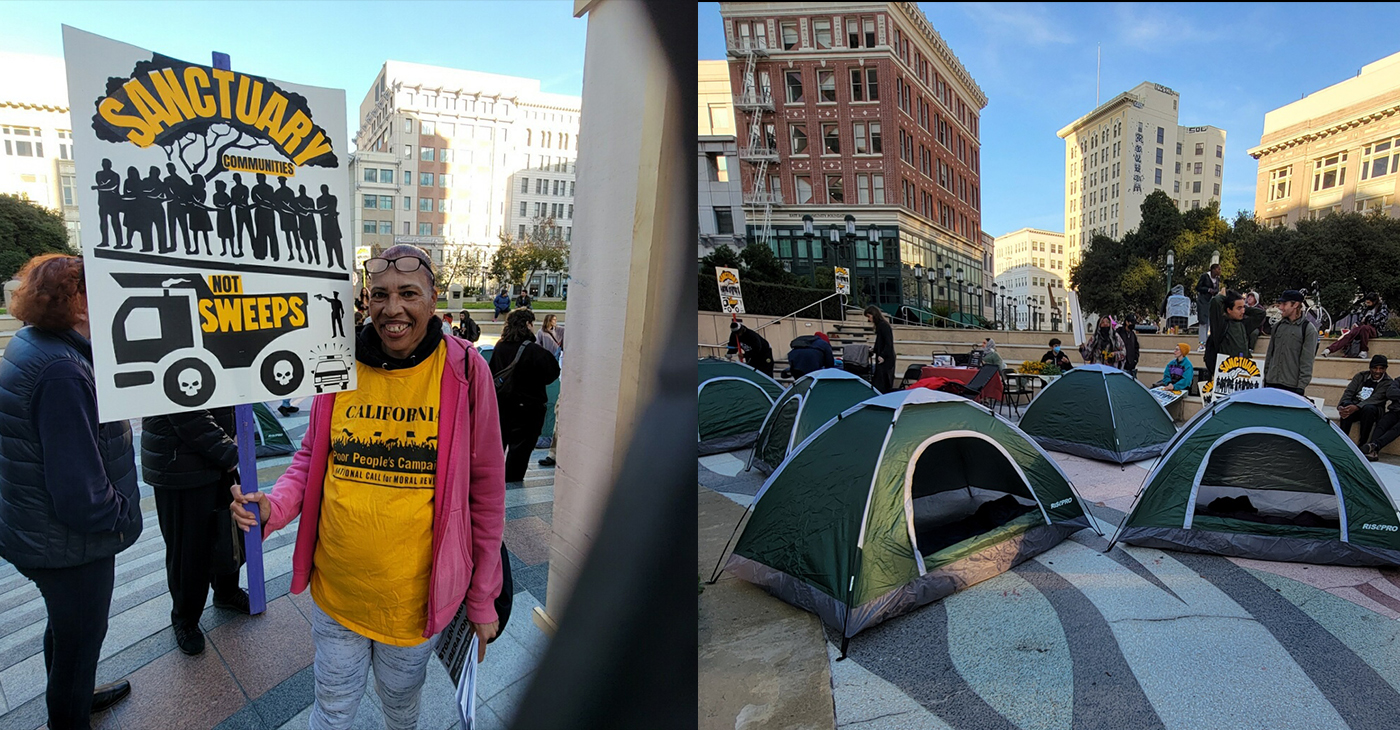City Government
Mayor Libby Schaaf’s Administration and Her Allies Block Funding for Construction Job Training

By Desley Brooks | District 6 Council- member
In Part I of this article, Councilmember Brooks wrote that “The Council, Mayor and Administration have once again failed to deliver for our residents who are being left out of this boom economy,” basing their opposition on a legal argument.
Councilmembers Rebecca Kaplan and Noel Gallo voted last week for spending city money to support construction job training for Oakland workers.
It is this kind of “analysis” and “opinion making” around our status quo workforce system and reliance on the Workforce Investment Board that has delayed real workforce investment, kept 20 percent of African Americans and 11 percent of Latinos unemployed and continues to move generations of disenfranchised old Oaklanders out of Oakland through gentrification and displacement.
I had my staff contact the Regional Director of the Department of Labor, who is responsible for the Workforce Innovation and Opportunity Act (WIOA), to ask two questions:
- When a municipality spends non-WIOA (Workforce Innovation and Opportunity Act) monies on job training, does it need to get approval from the Workforce Investment Board (WIB)?
- The Code of Federal Regulations (CFR) states that it is the vision of the WIB to have one comprehensive plan, but is it mandated that there be only one plan?
The Regional Director replied as follows: “Non WIOA monies are not subject to those restrictions. and the ‘vision for a comprehensive plan’ does not restrict municipalities from funding whatever job training they want.”
Amid a worsening homeless crisis, record displacement and Black youth unemployment over 30 percent, Mayor Schaaf, the City Attorney and their allies on City Council would rather play politics than propose a better solution to meaningfully address this crisis in our community.
The jobs legislation was modeled on policy the city passed years before to spend millions of public dollars directly to artists. Instead, the “Percent for Job Training” legislation failed with no counter solution. The legislation had proposed to invest over $6 million per year to successfully train, place and retain Oakland’s long disregarded Black and Brown women, youth and formerly incarcerated communities into career jobs.
This is especially frustrating because the City’s own data backs up stories I hear every day from constituents clearly showing that our community desperately needs major investment in job training and career development with room for advancement.
So, what do we do when innovative measures are stalled by months of political gamesmanship by Mayor Libby Schaaf’s administration and her allies? What do we do when there continues to be a pattern that mainstream media still has not connected the dots on where Mayor Schaaf fails (many times intentionally) to implement Council ideas and policy?
If you haven’t followed the lack of follow through by the Administration, readers should look at two recent articles where Mayor’s Schaaf’s administration has continued to fail to provide leadership to implement Council policy (especially ones I have pushed for) and failing to spend nearly $8 million in funding to help stabilize and invest in Oakland’s neediest communities of color.
- Oakland Failed to Spend $2.2 Million on Anti Displacement and Homeless Assistance
- Oakland drags its feet in helping equity pot startups
The East Bay Express reported on Schaaf’s administration sat on millions to address the homeless crisis for over 11 months during a time when the city’s homeless population has been swelling and long-term residents, many of whom do not have the incomes to sustain high rents and skyrocketing home prices, are driven from the city.
The SF Chronicle shows that despite some of my Council colleagues and my efforts to push for innovative equity approaches to protect and support poor and working families, the mayor’s administration stalls implementation of our policy, the result, Oakland’s low-income communities of color are left out or pushed out.
Back to investment in jobs, as a token, the Mayor did offer $275,000 in one-time funding for job training, preparation and placement, a fraction of the over $6 million needed per year.
Mayor Schaaf’s proposed $275,000 would train and place an estimated 40 people versus the proposal authored by myself and Councilmember Gallo would support 900 to 1,000 people per year.
With Black youth unemployment and dropout rates at over 30 percent and Summer upon us, it is especially appalling that Mayor Schaaf would commit less than five percent of what we’re asking.
It is past the time to pass this legislation and deliver equity on jobs!
Please join me in calling on the City to support working families like they do artists. We shouldn’t have to struggle with Oakland’s status quo administration that would rather criticize innovation, sit on millions of dollars or throw pennies at systemic problems.
To get involved in this effort to win a “Percent for Jobs” please email me directly at desleyb@gmail.com.
Bay Area
Glydways Breaking Ground on 14-Acre Demonstration Facility at Hilltop Mall
Glydways has been testing its technology at CCTA’s GoMentum Station in Concord for several years. The company plans to install an ambitious 28-mile Autonomous Transit Network in East Contra Costa County. The new Richmond facility will be strategically positioned near that project, according to Glydways.

The Richmond Standard
Glydways, developer of microtransit systems using autonomous, small-scale vehicles, is breaking ground on a 14-acre Development and Demonstration Facility at the former Hilltop Mall property in Richmond, the Contra Costa Transportation Authority (CCTA) reported on social media.
Glydways, which released a statement announcing the project Monday, is using the site while the mall property undergoes a larger redevelopment.
“In the interim, Glydways will use a portion of the property to showcase its technology and conduct safety and reliability testing,” the company said.
Glydways has been testing its technology at CCTA’s GoMentum Station in Concord for several years. The company plans to install an ambitious 28-mile Autonomous Transit Network in East Contra Costa County. The new Richmond facility will be strategically positioned near that project, according to Glydways.
The new Richmond development hub will include “over a mile of dedicated test track, enabling Glydways to refine its solutions in a controlled environment while simulating real-world conditions,” the company said.
Visitors to the facility will be able to experience on-demand travel, explore the control center and visit a showroom featuring virtual reality demonstrations of Glydways projects worldwide.
The hub will also house a 13,000-square-foot maintenance and storage facility to service the growing fleet of Glydcars.
“With this new facility [at the former Hilltop Mall property], we’re giving the public a glimpse of the future, where people can experience ultra-quiet, on-demand transit—just like hailing a rideshare, but with the reliability and affordability of public transit,” said Tim Haile, executive director of CCTA.
Janet Galvez, vice president and investment officer at Prologis, owner of the Hilltop Mall property, said her company is “thrilled” to provide space for Glydways and is continuing to work with the city on future redevelopment plans for the broader mall property.
Richmond City Manager Shasa Curl added that Glydways’ presence “will not only help test new transit solutions but also activate the former Mall site while preparation and finalization of the Hilltop Horizon Specific Plan is underway.
Alameda County
Last City Council Meeting of the Year Ends on Sour Note with Big Budget Cuts
In a five to one vote, with Councilmembers Carroll Fife and Janani Ramachandran excused, the council passed a plan aimed at balancing the $130 million deficit the city is facing. Noel Gallo voted against the plan, previously citing concerns over public safety cuts, while Nikki Fortunato-Bas, Treva Reid, Rebecca Kaplan, Kevin Jenkins, and Dan Kalb voted in agreement with the plan.

By Magaly Muñoz
In the last lengthy Tuesday meeting of the Oakland City Council for 2024, residents expressed strong opposition to the much needed budget cuts before a change in leadership was finalized with the certification of election results.
In a five to one vote, with Councilmembers Carroll Fife and Janani Ramachandran excused, the council passed a plan aimed at balancing the $130 million deficit the city is facing. Noel Gallo voted against the plan, previously citing concerns over public safety cuts, while Nikki Fortunato-Bas, Treva Reid, Rebecca Kaplan, Kevin Jenkins, and Dan Kalb voted in agreement with the plan.
Oakland police and fire departments, the ambassador program, and city arts and culture will all see significant cuts over the course of two phases.
Phase 1 will eliminate two police academies, brown out two fire stations, eliminate the ambassador program, and reduce police overtime by nearly $25 million. These, with several other cuts across departments, aim to save the city $60 million. In addition, the council simultaneously approved to transfer restricted funds into its general purpose fund, amounting to over $40 million.
Phase 2 includes additional fire station brownouts and the elimination of 91 jobs, aiming to recover almost $16 million in order to balance the rest of the budget.
Several organizations and residents spoke out at the meeting in hopes of swaying the council to not make cuts to their programs.
East Oakland Senior Center volunteers and members, and homeless advocates, filled the plaza just outside of City Hall with rallies to show their disapproval of the new budget plan. Senior residents told the council to “remember that you’ll get old too” and that disturbing their resources will only bring problems for an already struggling community.
While city staff announced that there would not be complete cuts to senior center facilities, there would be significant reductions to staff and possibly inter-program services down the line.
Exiting council member and interim mayor Bas told the public that she is still hopeful that the one-time $125 million Coliseum sale deal will proceed in the near future so that the city would not have to continue with drastic cuts. The deal was intended to save the city for fiscal year 2024-25, but a hold up at the county level has paused any progress and therefore millions of dollars in funds Oakland desperately needs.
The Coliseum sale has been a contentious one. Residents and city leaders were originally against using the deal as a way to balance the budget, citing doubts about the sellers, the African American Sports and Entertainment Group’s (AASEG), ability to complete the deal. Council members Reid, Ramachandran, and Gallo have called several emergency meetings to understand where the first installments of the sale are, with little to no answers.
Bas added that as the new Alameda County Supervisor for D5, a position she starts in a few weeks, she will do everything in her power to push the Coliseum sale along.
The city is also considering a sales tax measure to put on the special election ballot on April 15, 2025, which will also serve as an election to fill the now vacant D2 and mayor positions. The tax increase would raise approximately $29 million annually for Oakland, allowing the city to gain much-needed revenue for the next two-year budget.
The council will discuss the possible sales tax measure on January 9.
Activism
Protesters Gather in Oakland, Other City Halls, to Halt Encampment Sweeps
The coordinated protests on Tuesday in San Francisco, Oakland, Vallejo, Fresno, Los Angeles and Seattle, were hosted by Poor Magazine and Wood Street Commons, calling on cities to halt the sweeps and focus instead on building more housing.

By Post Staff
Houseless rights advocates gathered in Oakland, San Francisco, Los Angeles, and other city halls across California and Washington state this week protesting increased sweeps that followed a U.S. Supreme Court decision over the summer.
The coordinated protests on Tuesday in San Francisco, Oakland, Vallejo, Fresno, Los Angeles and Seattle, were hosted by Poor Magazine and Wood Street Commons, calling on cities to halt the sweeps and focus instead on building more housing.
“What we’re dealing with right now is a way to criminalize people who are dealing with poverty, who are not able to afford rent,” said rights advocate Junebug Kealoh, outside San Francisco City Hall.
“When someone is constantly swept, they are just shuffled and things get taken — it’s hard to stay on top of anything,” said Kealoh.
Local houseless advocates include Victoria King, who is a member of the coordinating committee of the California Poor People’s Campaign. She and Dr. Monica Cross co-chair the Laney Poor People’s Campaign.
The demonstrations came after a June Supreme Court ruling expanded local governments’ authority to fine and jail people for sleeping outside, even if no shelter is available. Gov. Gavin Newsom in California followed up with an order directing state agencies to crack down on encampments and urging local governments to do the same.
Fresno, Berkeley and a host of other cities implemented new rules, making it easier for local governments to clear sidewalk camps. In other cities, such as San Francisco, officials more aggressively enforced anti-camping laws already on the books.
-

 California Black Media4 weeks ago
California Black Media4 weeks agoCalifornia to Offer $43.7 Million in Federal Grants to Combat Hate Crimes
-

 Black History4 weeks ago
Black History4 weeks agoEmeline King: A Trailblazer in the Automotive Industry
-

 California Black Media4 weeks ago
California Black Media4 weeks agoGov. Newsom Goes to Washington to Advocate for California Priorities
-

 Activism4 weeks ago
Activism4 weeks agoOakland Post: Week of November 27 – December 3, 2024
-

 California Black Media4 weeks ago
California Black Media4 weeks agoCalifornia Department of Aging Offers Free Resources for Family Caregivers in November
-

 Activism2 weeks ago
Activism2 weeks agoButler, Lee Celebrate Passage of Bill to Honor Congresswoman Shirley Chisholm with Congressional Gold Medal
-

 Activism2 weeks ago
Activism2 weeks agoPost News Group to Host Second Town Hall on Racism, Hate Crimes
-

 Activism2 weeks ago
Activism2 weeks agoDelta Sigma Theta Alumnae Chapters Host World AIDS Day Event






















































